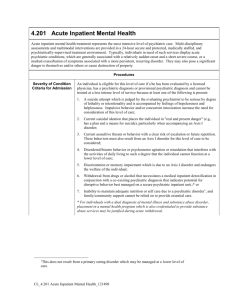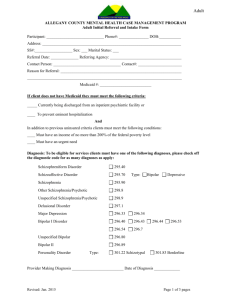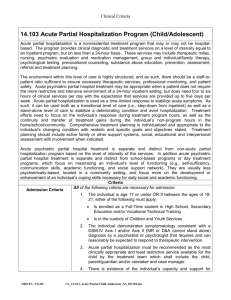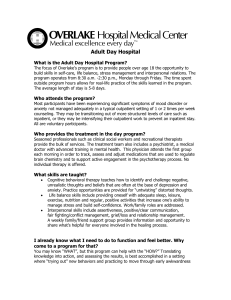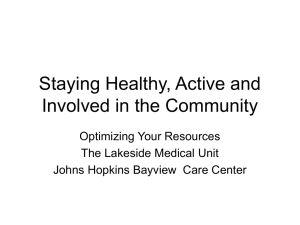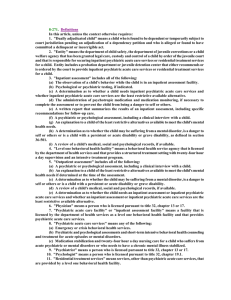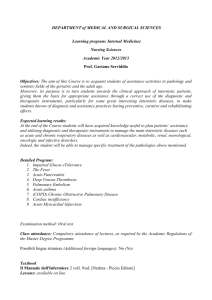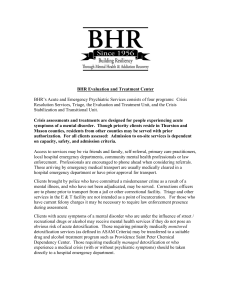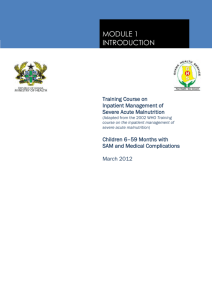Acute Inpatient Mental Health
advertisement
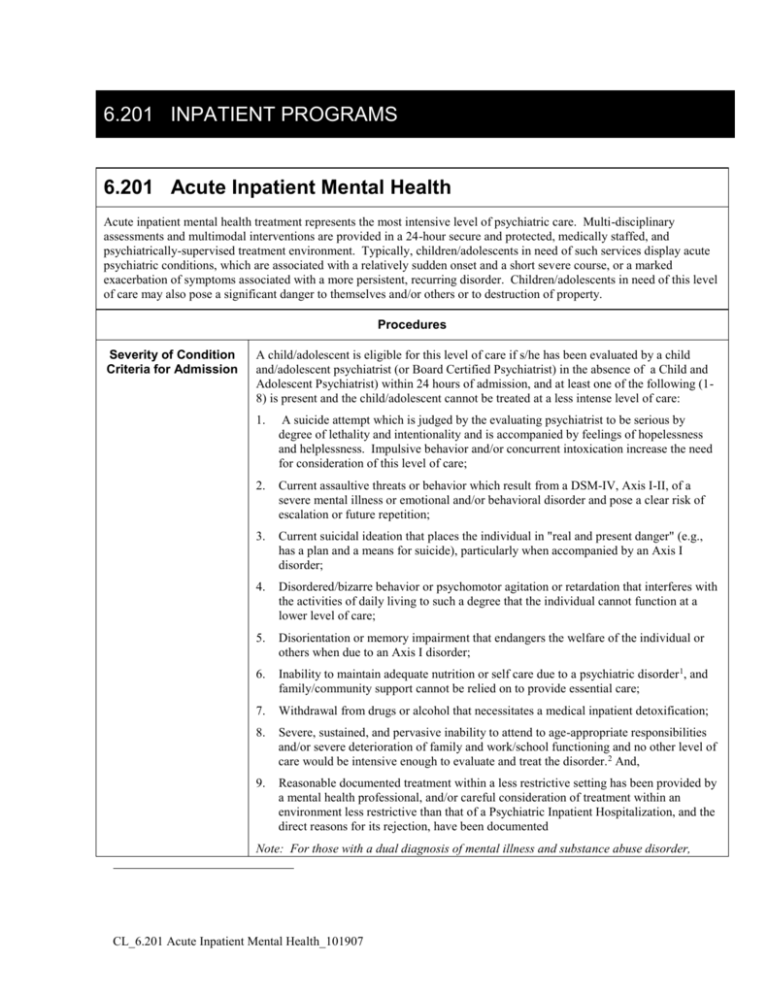
6.201 INPATIENT PROGRAMS 6.201 Acute Inpatient Mental Health Acute inpatient mental health treatment represents the most intensive level of psychiatric care. Multi-disciplinary assessments and multimodal interventions are provided in a 24-hour secure and protected, medically staffed, and psychiatrically-supervised treatment environment. Typically, children/adolescents in need of such services display acute psychiatric conditions, which are associated with a relatively sudden onset and a short severe course, or a marked exacerbation of symptoms associated with a more persistent, recurring disorder. Children/adolescents in need of this level of care may also pose a significant danger to themselves and/or others or to destruction of property. Procedures Severity of Condition Criteria for Admission A child/adolescent is eligible for this level of care if s/he has been evaluated by a child and/adolescent psychiatrist (or Board Certified Psychiatrist) in the absence of a Child and Adolescent Psychiatrist) within 24 hours of admission, and at least one of the following (18) is present and the child/adolescent cannot be treated at a less intense level of care: 1. A suicide attempt which is judged by the evaluating psychiatrist to be serious by degree of lethality and intentionality and is accompanied by feelings of hopelessness and helplessness. Impulsive behavior and/or concurrent intoxication increase the need for consideration of this level of care; 2. Current assaultive threats or behavior which result from a DSM-IV, Axis I-II, of a severe mental illness or emotional and/or behavioral disorder and pose a clear risk of escalation or future repetition; 3. Current suicidal ideation that places the individual in "real and present danger" (e.g., has a plan and a means for suicide), particularly when accompanied by an Axis I disorder; 4. Disordered/bizarre behavior or psychomotor agitation or retardation that interferes with the activities of daily living to such a degree that the individual cannot function at a lower level of care; 5. Disorientation or memory impairment that endangers the welfare of the individual or others when due to an Axis I disorder; 6. Inability to maintain adequate nutrition or self care due to a psychiatric disorder 1, and family/community support cannot be relied on to provide essential care; 7. Withdrawal from drugs or alcohol that necessitates a medical inpatient detoxification; 8. Severe, sustained, and pervasive inability to attend to age-appropriate responsibilities and/or severe deterioration of family and work/school functioning and no other level of care would be intensive enough to evaluate and treat the disorder. 2 And, 9. Reasonable documented treatment within a less restrictive setting has been provided by a mental health professional, and/or careful consideration of treatment within an environment less restrictive than that of a Psychiatric Inpatient Hospitalization, and the direct reasons for its rejection, have been documented Note: For those with a dual diagnosis of mental illness and substance abuse disorder, CL_6.201 Acute Inpatient Mental Health_101907 placement in a mental health program which is also credentialed to provide substance abuse services may be justified during acute withdrawal. Intensity of Service and Continued Stay Criteria Psychosocial Factors Exclusion Criteria Discharge Criteria At least one of the following criteria must be necessary for continued treatment at this level of care: 1. Close and continuous skilled medical observation and supervision to make significant changes in psychotropic medication; 2. Continuous observation and control of behavior (e.g., isolation, restraining, other suicidal/homicidal precautions) to protect individual, others, and/or property; 3. Close and continuous skilled medical observation due to dangerous side effects (e.g., hypotension, arrhythmia) of psychotropic medication; or 4. A comprehensive multi-modal therapy plan requiring close supervision and coordination in a medical (psychiatric) setting. These factors, as detailed in Section 2.10, may change the risk assessment and should be considered when making level of care placement decisions. Any of the following criteria are sufficient for exclusion from this level of care: 1. Condition is diagnosed as long-term in nature requiring placement in a long-term facility; 2. Symptoms result from a medical condition which warrants a medical/surgical setting for treatment; 3. Child/adolescent can be effectively treated at a less intensive level of care. Any of the following criteria are sufficient for discharge from this level of care: 1. Treatment plan goals and objectives have been substantially met and symptoms, functional impairments and/or coexisting medical conditions that necessitated admission or continued have diminished in severity; or 2. No longer meets admission criteria or meets criteria for a less/more intensive level of care; or 3. Individual is non-participatory with treatment and/or no longer a danger to self/others, withdraws from treatment and does not meet criteria for involuntary commitment; and 4. There is a viable discharge plan which includes living arrangements and follow-up care; or 5. Acute physical condition necessitates transfer to a medical facility. 6. Transfer to a lesser level of care is unlikely to produce re-emergence of admission criteria. CL_6.201 Acute Inpatient Mental Health_101907 CL_6.201 Acute Inpatient Mental Health_101907
